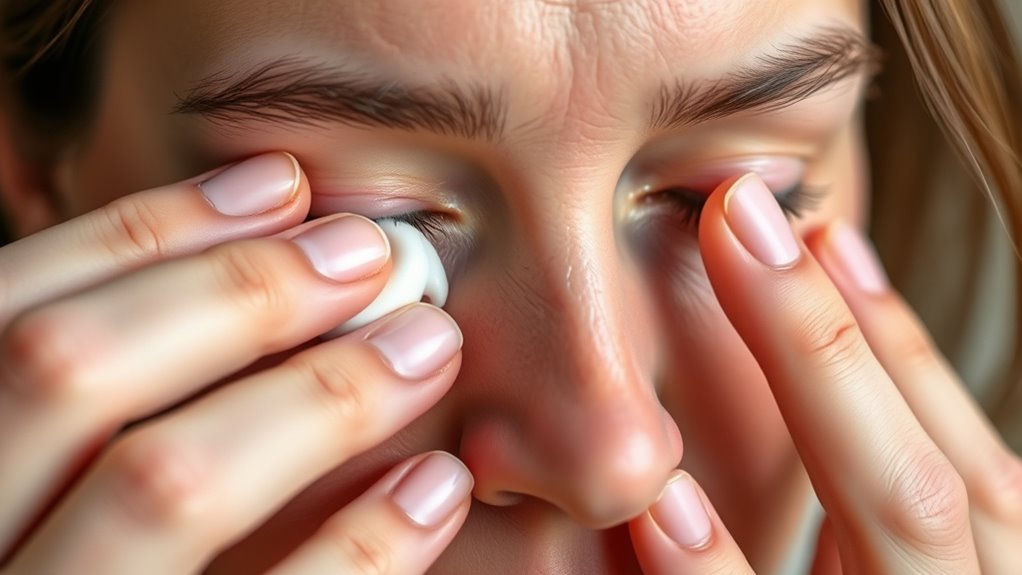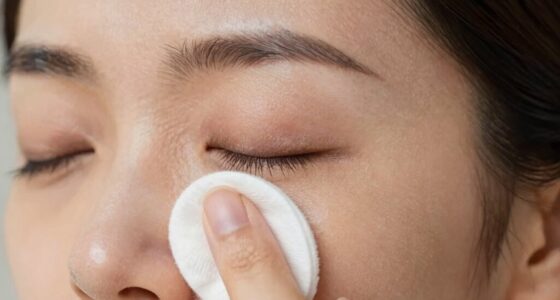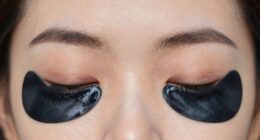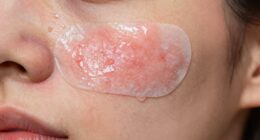During allergy season, soothing your under-eye skin is key to reducing irritation, puffiness, and redness. Rinse your eyes with cold water or saline to flush out allergens, and apply a cold compress for quick relief. Use gentle remedies like cooled chamomile tea bags or aloe vera to calm inflammation. Keeping your environment allergen-free and staying hydrated also helps. For more tips on keeping your eyes comfortable and healthy, keep exploring these effective strategies.
Key Takeaways
- Use cold compresses or cooled chamomile tea bags to reduce swelling and soothe irritated under-eye skin.
- Keep windows closed and use HEPA air purifiers to minimize allergen exposure indoors.
- Gently rinse eyes with saline or cold water to flush out irritants and relieve redness.
- Apply aloe vera gel for natural hydration and to calm inflammation around the eyes.
- Avoid rubbing eyes; incorporate environmental and dietary measures to prevent flare-ups and protect skin.
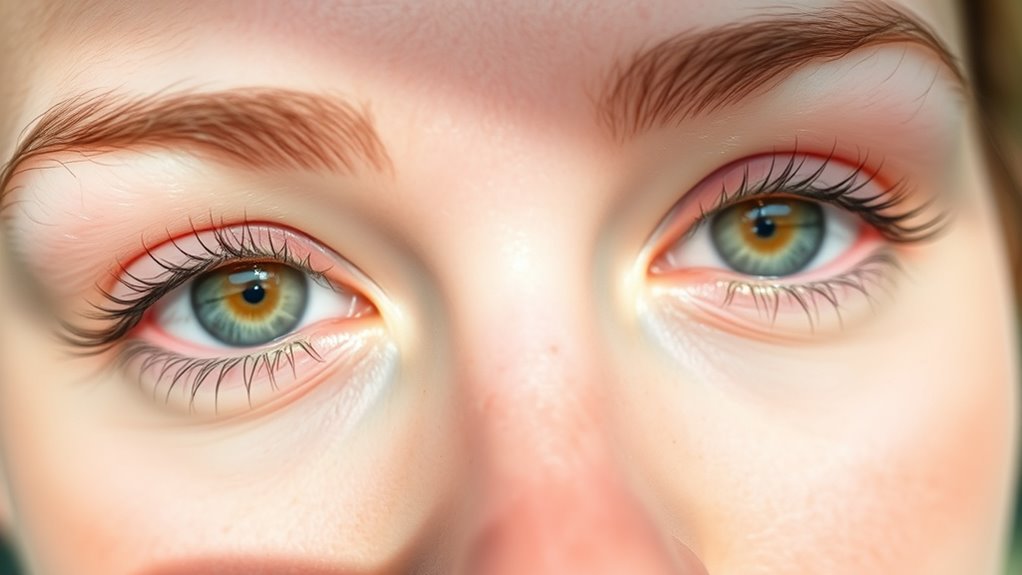
As allergy season ramps up, your eyes are often the first to show signs of irritation. You might notice redness, itching, or puffiness around your under-eye area. These symptoms can be both uncomfortable and distracting, but the good news is that you can take proactive steps to soothe and protect your eyes. Incorporating natural remedies into your routine can be an effective way to manage allergy symptoms and support allergy prevention. By doing so, you not only ease immediate discomfort but also help reduce the frequency and severity of flare-ups over time.
Start by rinsing your eyes with cold water or a saline solution at the first sign of irritation. This simple step helps flush out allergens and irritants that have settled on your skin and conjunctiva, providing quick relief. You can also use cold compresses on your eyes for 10-15 minutes, which constricts blood vessels, reducing swelling and redness. These natural remedies are gentle, cost-effective, and free of harsh chemicals, making them ideal for sensitive under-eye skin.
Rinse with cold water or saline and apply cold compresses for quick, gentle allergy relief.
To further prevent allergy symptoms from worsening, consider adjusting your environment. Keep windows closed during high pollen seasons and use air purifiers with HEPA filters to trap airborne allergens. Regularly washing your bedding, pillowcases, and curtains can also reduce the accumulation of dust, pollen, and pet dander. These allergy prevention tips create a cleaner space that minimizes allergen exposure and lessens the burden on your eyes.
In addition to environmental controls, focus on strengthening your body’s natural defenses by maintaining a healthy diet rich in antioxidants. Foods like berries, leafy greens, and citrus fruits can help reduce inflammation and bolster your immune response. Staying well-hydrated keeps your skin supple and helps flush toxins that may aggravate irritation around your eyes. Avoid rubbing your eyes, as this can break delicate skin and introduce bacteria, further inflaming the area.
Many natural remedies, such as applying cooled chamomile tea bags or aloe vera gel, can soothe itchy under-eye skin. Chamomile has anti-inflammatory properties that calm irritated tissue, while aloe vera offers hydration and healing. Always test a small patch before applying any new remedy to ensure you don’t have an allergic reaction. Combining these natural approaches with good hygiene and allergy prevention strategies creates a thorough plan to keep your eyes comfortable during allergy season.
Frequently Asked Questions
Can Allergy Eye Drops Cause Long-Term Eye Damage?
Allergy eye drops generally don’t cause long-term eye damage if used as directed. However, misuse or overuse can lead to safety concerns, like rebound redness or increased eye irritation. It’s important that you follow your doctor’s instructions and avoid excessive use. Regular check-ups can help prevent any potential long-term effects, ensuring your eyes stay healthy while managing allergy symptoms effectively.
Are Natural Remedies Effective for Allergy-Related Under-Eye Swelling?
Imagine a cool, gentle breeze easing your eye swelling. Natural remedies can be effective for allergy-related under-eye swelling, providing soothing relief without harsh chemicals. Ingredients like chamomile, cucumber, and cold tea bags work to reduce inflammation and calm irritated skin. While they may not eliminate swelling instantly, consistent use can help diminish puffiness and soothe your eyes, making you feel more comfortable during allergy season.
How Can I Prevent Eye Allergies During Pollen Season?
To prevent eye allergies during pollen season, you should prioritize pollen avoidance by staying indoors during peak pollen hours and keeping windows closed. Wearing protective eyewear, like sunglasses or goggles, creates a barrier against pollen particles and reduces irritation. Regularly wash your hands and face to remove pollen, and consider using air purifiers indoors. These steps help minimize exposure and keep your eyes comfortable throughout allergy season.
Are There Specific Skincare Ingredients to Avoid During Allergy Season?
During allergy season, you should avoid skincare ingredients with harsh chemicals and fragrance allergens, as they can irritate sensitive under-eye skin. Imagine your skin as a delicate canvas—exposing it to strong chemicals can cause redness and swelling. Instead, choose gentle, fragrance-free products with soothing ingredients like aloe or chamomile. These help calm your skin and reduce allergy flare-ups, keeping your under-eye area healthy and comfortable.
When Should I See a Doctor for Persistent Allergy Eye Symptoms?
You should see a doctor if your allergy eye symptoms persist beyond a week, worsen, or interfere with daily activities. Consider a pediatric consultation if your child’s symptoms are chronic or severe. Seek professional help for proper diagnosis and chronic symptom management, especially if over-the-counter remedies aren’t effective. Prompt medical attention guarantees proper treatment and prevents complications, helping you or your child find relief faster.
Conclusion
During allergy season, taking care of your under-eye skin isn’t just about comfort—it’s about trusting your body’s signals. Some say the puffiness and irritation are just allergies, but recent studies suggest it’s also your skin’s way of fighting back. So, don’t ignore those symptoms. Use gentle eye care, stay hydrated, and give your skin the love it needs. After all, a little extra care might just keep those allergy woes at bay!
